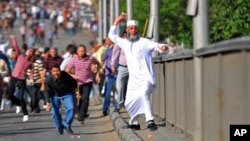CAIRO —
Emotions are high and crowds are thick at Egyptian protests, which continue to draw masses of people every day.
On the front lines are photojournalists, who, these days, are not just in the line of fire, but often the target.
Twenty-three-year-old Mostafa Darwish is a photographer for an Egyptian newspaper called el-Badil and for the Associated Press. He says the last time he was attacked was at Tahrir Square a little over a week ago.
"They [caught] me last [in] clashes in Tahrir Square about one week ago, or 10 days ago," he says. "They took a memory card but not too hard. Thank God, I was okay."
Describing other recent attacks on colleagues by protesters both for and against ousted President Mohamed Morsi, in addition to the police, Darwish says last week his colleague Mohammad Saad was beaten in the head and left bleeding on the streets without a camera.
Last month the Committee to Protect Journalists reported a spike in attacks on journalists, including dozens of beatings and at least two deaths.
Egyptian photographers, who often work for both local and international news outlets, say the numbers are much higher.
Nasser Nouri, el-Badil’s chief photo editor, says his 14 photographers, including two women, have been harassed, beaten or robbed in the streets in recent weeks. Protesters for both sides accuse photographers of being agents for the other side, he says, and even police officers sometimes accuse them of negative portrayals.
With photographers’ lives increasingly in danger, Nouri says impartial journalism itself falls causality to the violence.
"I think all parts will create media to support him," he says. "If I am against Muslim Brotherhood I will be in this part and I will shoot from this part to shoot what these people are doing."
Nouri compares what’s happening in Egypt now to Syria, where particularly at the beginning of the war rebel soldiers gained international sympathy by protecting journalists on the front lines.
But for Egyptian photojournalists, he says, it is more complex, because many local news sources do take sides. Both the military-led interim government and the Muslim Brotherhood have accused the media of inciting violence.
As the interim government and pro-Morsi demonstrators continue their standoff on the streets, Nouri says, the photographers will continue to be caught in the middle.
On the front lines are photojournalists, who, these days, are not just in the line of fire, but often the target.
Twenty-three-year-old Mostafa Darwish is a photographer for an Egyptian newspaper called el-Badil and for the Associated Press. He says the last time he was attacked was at Tahrir Square a little over a week ago.
"They [caught] me last [in] clashes in Tahrir Square about one week ago, or 10 days ago," he says. "They took a memory card but not too hard. Thank God, I was okay."
Describing other recent attacks on colleagues by protesters both for and against ousted President Mohamed Morsi, in addition to the police, Darwish says last week his colleague Mohammad Saad was beaten in the head and left bleeding on the streets without a camera.
Last month the Committee to Protect Journalists reported a spike in attacks on journalists, including dozens of beatings and at least two deaths.
Egyptian photographers, who often work for both local and international news outlets, say the numbers are much higher.
Nasser Nouri, el-Badil’s chief photo editor, says his 14 photographers, including two women, have been harassed, beaten or robbed in the streets in recent weeks. Protesters for both sides accuse photographers of being agents for the other side, he says, and even police officers sometimes accuse them of negative portrayals.
With photographers’ lives increasingly in danger, Nouri says impartial journalism itself falls causality to the violence.
"I think all parts will create media to support him," he says. "If I am against Muslim Brotherhood I will be in this part and I will shoot from this part to shoot what these people are doing."
Nouri compares what’s happening in Egypt now to Syria, where particularly at the beginning of the war rebel soldiers gained international sympathy by protecting journalists on the front lines.
But for Egyptian photojournalists, he says, it is more complex, because many local news sources do take sides. Both the military-led interim government and the Muslim Brotherhood have accused the media of inciting violence.
As the interim government and pro-Morsi demonstrators continue their standoff on the streets, Nouri says, the photographers will continue to be caught in the middle.












